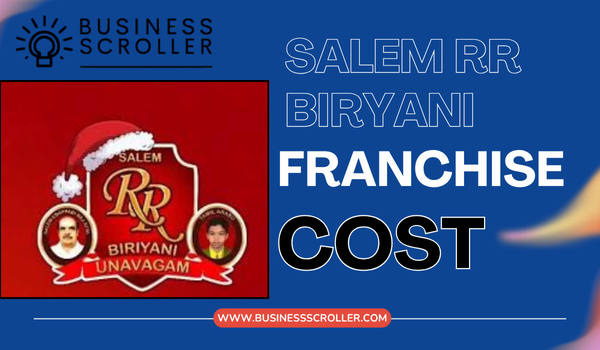If you’re considering a food-service franchise in South India, Salem RR Biryani is a name that often pops up for authentic, high-margin biryani businesses. This guide — written from the standpoint of an Indian franchise expert — breaks down the franchise model, estimated investment ranges, expected returns, eligibility checklist, step-by-step how to apply, and the official contact points so interested entrepreneurs can reach out directly.
Why consider a Salem RR Biryani franchise?
Salem RR Biryani has built strong regional brand recognition (particularly in Tamil Nadu) for its spicy, flavourful biryani and related South Indian non-veg dishes. The emotional value attached to biryani and strong repeat demand make well-run outlets potentially lucrative. The brand also actively promotes franchising and catering partnerships, which makes it easier for franchise aspirants to start conversations.
Franchise model — how Salem RR structures partnerships
Salem RR offers franchise opportunities and advertises partner models on its official site. One notable model they promote is FOCO — “Franchise Owned, Company Operated”: the franchisee invests and does the fit-out, while Salem RR handles day-to-day operations and kitchen management. This reduces operational risk for franchise owners who prefer revenue ownership without running the kitchen themselves. In practice they also promote catering, dine-in and outlet expansion via third-party operators depending on agreement specifics.
Estimated investment & franchise cost

Exact investment depends on format (dine-in, delivery-oriented outlet, or cloud kitchen), city tier, rent/lease conditions and fit-out standards. Public franchise listings and recent industry articles list these ballpark numbers you should treat as planning estimates until you get the official franchise pack from Salem RR:
- Small / delivery or compact outlet (500–800 sq.ft.): ₹25 lakh – ₹50 lakh (approx.) — lower fit-out, limited seating, focused on delivery/takeaway.
- Full dine-in outlet (800–2,000 sq.ft.): ₹50 lakh – ₹1 crore — includes higher fit-out, kitchen equipment, furniture, initial inventory and working capital.
- Higher estimates / premium locations: Some franchise portals and listings have cited figures up to ₹85 lakh – ₹1 crore for larger stores including rental deposits and setting up a central-kitchen connection. These ranges appear in recent franchise write-ups and aggregator sites — always confirm exact breakup with Salem RR.
What these figures typically cover: franchise/brand onboarding costs (if any), kitchen equipment, interiors & signage, initial raw-material inventory, staff recruitment & training, working capital for first 2–6 months, and local licensing costs. Rent / deposit is often the single biggest variable.
Ongoing fees, margins & likely ROI
Salem RR’s public pages don’t list standard royalty percentages. Industry comparators in the regional biryani/QSR space commonly charge royalty fees in the 4–8% range plus a marketing contribution — but the exact Salem RR structure will be in their franchise agreement. Profitability depends heavily on rents, food cost control, average order value and whether the outlet is delivery-heavy (delivery platforms add commission pressure). Typical expectations:
- Gross margins on biryani can be healthy if supply and yield are controlled, but net margins after rent, staff and commissions typically fall to 10–18% for well-managed outlets.
- Break-even / payback: conservative plans assume 2–4 years in high-performing locations; some aggregators list longer payback for full dine-in models if rent is high. Again — local realities vary.
Who is eligible — typical franchisee profile
While Salem RR doesn’t publish a rigid checklist publicly, franchise owners that succeed typically share these attributes:
- Financial capacity to invest the initial capital and manage working capital for 3–6 months.
- Real estate control — either ownership or the ability to secure a long-term lease in a high-footfall location (mall, arterial high-street, commercial cluster or college/office hub).
- Business or F&B operations experience is strongly preferred — even though the FOCO model reduces operational burden, understanding labour, quality control and customer service helps.
- Commitment to brand standards — strict adherence to recipes, hygiene and service protocols is required to protect brand reputation.
- Willingness to invest in local marketing and community engagement (catering tie-ups, festive promotions) to build repeat business.
Prepare basic documents: identity, proof of funds/bank statements, business profile, and property details for the proposed outlet.
Step-by-step: how to apply (practical checklist)
- Preliminary research — visit existing Salem RR outlets in the nearest city to study menu, pricing, peak times and customer profile.
- Budget & funding — lock in how much you can invest and whether you need bank/partner funding. Include rent deposit in your plan.
- Reach out to Salem RR — send a concise franchise enquiry with your city, location details (or site proposals), proof of funds and a short business profile. Use the official contact emails listed below.
- Get the franchise pack — the company should provide an information pack: investment breakup, royalty terms, training & operational support, territory exclusivity details.
- Site evaluation & approval — submit site photos/floor plans; Salem RR will typically run a site audit.
- Sign commercial terms — review franchise agreement, negotiate any terms, confirm timeline for fit-out and supply chain onboarding.
- Licenses & permits — arrange FSSAI, health & trade licences, fire safety etc. (franchisor will usually advise).
- Fit-out & training — complete kitchen fit-out per brand SOPs; staff training may be provided by the company.
- Soft launch & scale — start with a soft opening, collect customer feedback, then do a full launch and local marketing push.
Official contact — where to send your franchise enquiry
Salem RR Biryani lists franchise/catering contact details on its official site and social channels. Use these to make a formal approach:
- Email(s): hotelsalemrr13@gmail.com, info@salemrrbiryani.com, sales@salemrrbiryani.com.
- Phone (franchise/catering enquiries shown on social pages): +91 94447 38888 / +91 93808 99999.
When you email, use subject line: “Salem RR Franchise Enquiry — [City]” and attach (a) brief business profile, (b) proposed site photos/address, and (c) bank statement or proof of funds.
Final advice before you commit
- Do a local feasibility: check daily footfall, competing biryani/QSR brands, delivery economics and rental trajectory.
- Negotiate rent first: lower rent shortens payback the most.
- Ask for detailed P&L examples from the franchisor or existing franchisees — real store data trumps generic estimates.
- Understand supply chain: centralized raw-material sourcing or central kitchen fees affect per-plate cost.
- Get legal review of the franchise agreement to understand exit, renewal and exclusivity clauses.

Shashi Kant is the Founder and Editor of BusinessScroller.com, a leading platform for business insights, finance trends, and industry analysis. With a passion for journalism and expertise in business reporting, he curates well-researched content on market strategies, startups, and corporate success stories. His vision is to provide valuable information that empowers entrepreneurs and professionals. Under his leadership, BusinessScroller.com has grown into a trusted source for in-depth articles, customer care guides, and financial expertise.


